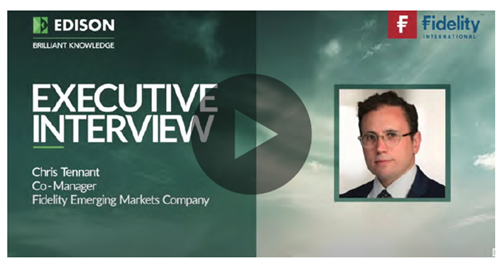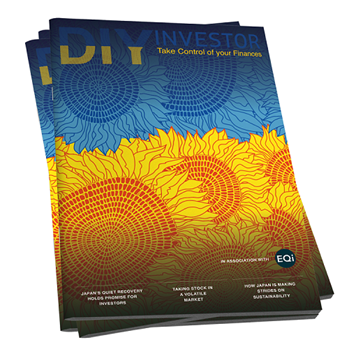Taking stock in a volatile market


Amid continued volatility across emerging markets, Fidelity Emerging Markets Limited portfolio manager Nick Price takes stock of recent developments and shares his latest views. With the prolonged war in Ukraine and China’s zero Covid policy weighing on investor sentiment, he provides an update on the portfolio and positioning amid continued uncertainty.
It has been a challenging year for emerging markets with the protracted war in Ukraine, Covid-19 related lockdowns in China, a stronger US dollar and expectations of more aggressive interest rate rises as central banks grapple with inflation and consumers face the rising cost of living.
The positioning in Russia had played a critical role in providing high dividends and commodity related exposure (directly and indirectly); these were important portfolio attributes which had served to counteract some of the headwinds before the war broke out.
Uncertain times have given rise to some extreme market moves. As Russia became un-investible, market participants redirected their attention to other commodity rich nations across the Middle East and Latin America to fill the gap.
The market has been led by news flow and changing sentiment. However, despite the current volatility, we believe that fundamentals will return to the fore as the unprecedented fiscal and monetary policy support begins to fade. Certainly, meaningful value has emerged as stocks have de-rated significantly and the overall discount to developed markets is wide.
PORTFOLIO POSITIONING
While the outlook is uncertain, we acknowledge that value stocks may continue to perform particularly well, therefore, as quality managers we are giving careful thought to portfolio composition. This year has bought about a remarkable change in our investible universe, requiring us to consider how best to recalibrate parts of the portfolio given Russia’s effective exclusion from the universe.
We have been seeking new opportunities in areas such as Brazil and the Middle East, spending time on the ground to meet with companies to enable us to make changes on a highly selective basis.
Our continued focus remains on owning well-capitalised businesses with under-levered balance sheets. Amongst the more recent additions to the portfolio are a series of relatively small positions, added on a highly selective, bottom-up basis, reflecting a move to rebalance the portfolio by adding value stocks, with quality characteristics.
We have raised exposure to Brazilian financials in both exchanges and the banking sector and have initiated new positions in Middle East. Dubai Electricity & Water Authority offers attractive dividend yield and has a favourable regulatory backdrop. It should also benefit from volume growth.
Meanwhile, the Chinese market is directionally looking more positive, with cheaper valuations, a more positive tone on platform regulations and possible stimulus measures given the rising unemployment rate. As a result, we are turning selectively optimistic on the China internet and property sectors but remain cautious on areas where the rising cost of living may dampen demand for consumer goods such as sportswear and autos.
We have sought to capitalise on particularly attractive valuations across a series of markets, making the most of the portfolio’s unconstrained, all cap approach which encapsulates frontier markets. The enhanced investment powers of the investment company allow us significant flexibility to take full advantage of a sizeable investible universe and to capitalise on the fantastic breadth of analyst coverage at Fidelity, with some 50 focused on emerging stocks.
We can use those powers to go short too, where we identify, those companies which are the weakest stocks most exposed to competitive threats and financial distress.
The ability to complement long investments with short positions provides additional sources of returns and is supported by our extensive global network of research analysts. Stock picking dictates the shape of the portfolio, while sector and country positions are a residual outcome of this approach.
LONG-TERM RESILIENCE
While this has undoubtedly been a turbulent period for emerging markets, we must acknowledge that there has always been unpredictability to the asset class.
Therefore, we place great emphasis on a prudent approach and are careful to ensure that this high conviction portfolio is balanced, and capital is allocated to companies that demonstrate quality characteristics such as healthy balance sheets and superior and sustainable profits.
While adverse headlines and sentiment have weighed heavy on financial markets, experience has taught us those fundamentals are rewarded over the longer-term and share prices follow the trajectory of earnings.
We are confident the portfolio remains resilient and well balanced with enduring quality characteristics centred around high returns, conservative balance sheets and low valuation multiples, and has the capacity to deliver attractive total shareholder returns in the long term.
Despite the undeniable short-term uncertainty, we believe the long-term case for investing in emerging markets remains strong.
The developing world is home to some of the world’s most innovative companies, a plethora of natural resources and provides access to a vast and evolving consumer base, attributes which create rich hunting ground for stock pickers.
More information about Fidelity Emerging Markets Limited here
FIDELITY EMERGING MARKETS – MANAGING IN
CHALLENGING TIMES
Important information
The value of investments can go down as well as up and investors may not get back the amount invested. Overseas investments will be affected by movements in currency exchange rates. Investments in emerging markets can be more volatile than other more developed markets. The use of financial derivative instruments for investment purposes, may expose the fund to a higher degree of risk and can cause investments to experience larger than average price fluctuations. Investors should note that the views expressed may no longer be current and may have already been acted upon. The shares in investment trusts are listed on the London Stock Exchange and their price is affected by supply and demand. Investment trusts can gain additional exposure to the market, known as gearing, potentially increasing volatility. Reference to specific securities should not be interpreted as a recommendation to buy or sell these securities and is only included for illustration purposes. This information is not a personal recommendation for any particular investment. If you are unsure about the suitability of an investment you should speak to an authorised financial adviser.
The latest annual reports, key information document (KID) and factsheets can be obtained from our website at www.fidelity.co.uk/its or by calling 0800 41 41 10. The full prospectus may also be obtained from Fidelity. The Alternative Investment Fund Manager (AIFM) of Fidelity Investment Trusts is FIL Investment Services (UK) Limited. Issued by Financial Administration Services Limited, authorised and regulated by the Financial Conduct Authority. Fidelity, Fidelity International, the Fidelity International logo and F symbol are trademarks of FIL Limited. UKM0622/370982/ISSCSO00080/NA
Read the latest edition of DIY Investor Magazine
DIY Investor Magazine
The views and opinions expressed by the author, DIY Investor Magazine or associated third parties may not necessarily represent views expressed or reflected by EQi.
The content in DIY Investor Magazine is non-partisan and we receive no commissions or incentives from anything featured in the magazine.
The value of investments can fall as well as rise and any income from them is not guaranteed and you may get back less than you invested. Past performance is not a guide to future performance.
DIY Investor Magazine delivers education and information, it does not offer advice. Copyright© DIY Investor (2016) Ltd, Registered in England and Wales. No. 9978366 Registered office: Mill Barn, Mill Lane, Chiddingstone, Kent TN8 7AA.


